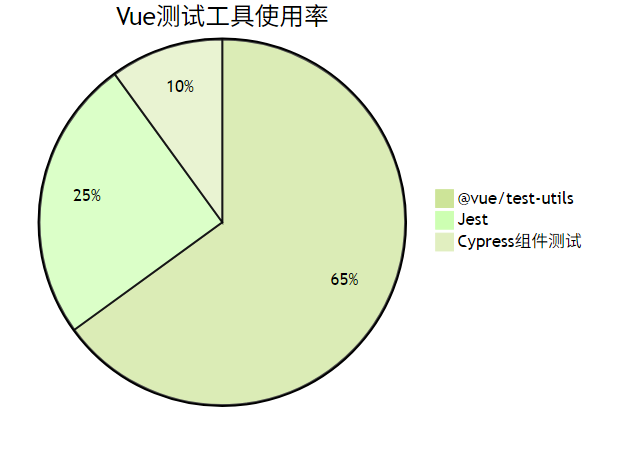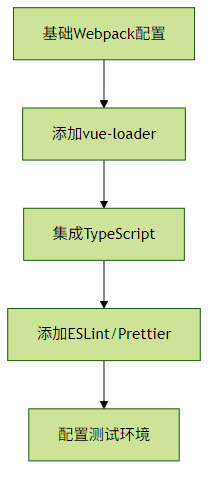Webpack与Vue深度集成:TypeScript和ESLint配置指南
Webpack与Vue工具链深度集成指南
一、TypeScript支持
1.1 配置TypeScript处理
在Vue项目中集成TypeScript需要特殊配置,因为Vue单文件组件(SFC)中的<script lang="ts">需要额外处理。
推荐方案一:使用ts-loader
// webpack.config.js
module.exports = {
module: {
rules: [
{
test: /\.ts$/,
loader: 'ts-loader',
options: {
appendTsSuffixTo: [/\.vue$/]
}
},
{
test: /\.vue$/,
loader: 'vue-loader'
}
]
}
}推荐方案二:使用Babel
// babel.config.js
module.exports = {
presets: [
['@babel/preset-typescript'],
['@babel/preset-env']
]
}1.2 类型检查
方案一:使用vue-tsc
npm install vue-tsc -D在package.json中添加:
{
"scripts": {
"type-check": "vue-tsc --noEmit"
}
}方案二:fork-ts-checker-webpack-plugin
// webpack.config.js
const ForkTsCheckerWebpackPlugin = require('fork-ts-checker-webpack-plugin');
module.exports = {
plugins: [
new ForkTsCheckerWebpackPlugin({
typescript: {
extensions: {
vue: {
enabled: true,
compiler: '@vue/compiler-sfc'
}
}
}
})
]
}实践建议:
- 开发环境推荐使用fork-ts-checker-webpack-plugin进行异步类型检查
- 生产构建前使用vue-tsc进行全面类型检查
- 为Vue组件编写.d.ts类型声明文件增强类型提示
二、ESLint/Prettier集成
2.1 ESLint配置
// webpack.config.js
const ESLintPlugin = require('eslint-webpack-plugin');
module.exports = {
plugins: [
new ESLintPlugin({
extensions: ['js', 'jsx', 'vue', 'ts', 'tsx'],
fix: true
})
]
}对应.eslintrc.js配置示例:
module.exports = {
extends: [
'eslint:recommended',
'plugin:vue/vue3-recommended',
'@vue/typescript/recommended'
],
rules: {
'vue/multi-word-component-names': 'off'
}
}2.2 Prettier集成
.prettierrc.js示例:
module.exports = {
semi: false,
singleQuote: true,
vueIndentScriptAndStyle: true,
htmlWhitespaceSensitivity: 'ignore'
}实践建议:
- 使用eslint-plugin-vue提供的Vue专用规则
- 配置保存时自动格式化(VSCode推荐)
- 对模板和脚本使用不同的缩进规则
三、测试工具集成
3.1 配置测试环境
// webpack.test.config.js
module.exports = {
module: {
rules: [
{
test: /\.vue$/,
loader: 'vue-loader'
},
{
test: /\.js$/,
loader: 'babel-loader',
options: {
presets: ['@babel/preset-env']
}
}
]
},
resolve: {
alias: {
vue$: 'vue/dist/vue.runtime.esm.js'
}
}
}3.2 编写测试用例
import { mount } from '@vue/test-utils'
import MyComponent from '../src/MyComponent.vue'
describe('MyComponent', () => {
test('renders correctly', () => {
const wrapper = mount(MyComponent, {
props: {
msg: 'Hello World'
}
})
expect(wrapper.text()).toContain('Hello World')
})
})测试工具对比:

实践建议:
- 单元测试:Jest + @vue/test-utils
- 组件测试:Storybook + @storybook/vue3
- E2E测试:Cypress或Playwright
- 测试覆盖率:使用istanbul或c8
四、工具链最佳实践
- 统一配置管理:使用
vue-cli或create-vue脚手架初始化项目,确保工具链版本兼容 - 渐进式集成:

性能优化:
- 开发环境禁用类型检查(提升HMR速度)
- 生产环境启用严格类型检查和代码优化
- 使用缓存加速构建(如babel-loader的cacheDirectory)
团队协作:
- 统一IDE配置(推荐VSCode + Volar扩展)
- 共享编辑器配置(如.vscode/settings.json)
- 使用Husky配置Git钩子(提交前自动lint和格式化)
通过合理配置这些工具链,可以显著提升Vue项目的开发体验、代码质量和维护性。建议根据项目规模选择合适的工具组合,避免过度工程化。
评论已关闭